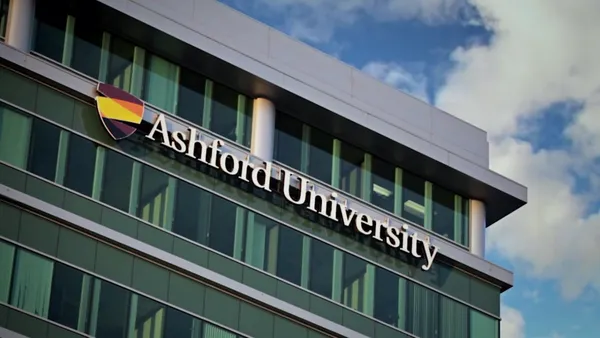Dive Brief:
- Ashford University announced Tuesday that the U.S. Department of Veterans Affairs (VA) gave it approval to continue to receive benefits under the GI Bill. The decision is retroactive to July 1, 2019.
- The decision follows the for-profit online university's drawn-out battle to remain eligible for GI Bill funding after the state of Iowa moved to pull its approval in 2016.
- It also comes as Ashford attempts to separate as an independent nonprofit from owner Zovio, an ed tech company formerly known as Bridgepoint Education.
Dive Insight:
The VA is acting in place of the California State Approving Agency for Veterans Education after it pulled the agency's oversight of military education benefits in September. That move followed a thorny debate between the two groups about how to supervise education providers that receive GI Bill funds, particularly for-profit colleges.
Ashford factored heavily into the dispute. In 2017, California's attorney general announced he was suing Ashford and its parent company, saying they misled students — allegations Zovio denies. State regulators said they wouldn't decide on Ashford's application for veteran benefits while the lawsuit was underway, KCBX reported, adding that the VA pushed the state agency to approve Ashford to receive the funds.
Ashford has retained the ability to offer veteran benefits to students, despite the debate over which state will approve them, Vickie Schray, Zovio's executive vice president and chief external affairs officer, told Education Dive in an interview Tuesday. The university voluntarily suspended new enrollments in the programs between November 2017 and February 2018, she said.
In its latest decision, the VA approved all but 20 of Ashford's programs for GI Bill eligibility. The company said in a press release that the unapproved programs "do not represent a significant number of students" and will not have a "material impact" on its total enrollment. Schray wouldn't confirm to Education Dive what those programs were, saying they hadn't been finalized.
A representative from the California Department of Veterans Affairs said they couldn't comment on the situation because they are no longer the approving agency for the state.
Ashford is the 13th-largest recipient of VA funds, Politico reported. Of the 34,710 students Ashford enrolled in the fall of 2018, 11% used VA benefits, a university spokesperson told Education Dive in an email.
The dispute over Ashford's access to GI Bill funds dates to 2016, when the Iowa Department of Education said the state would no longer approve the university's programs because it was closing a campus there. It was approved through Arizona before the VA's latest decision, Schray said.
For-profit colleges have been criticized for their focus on recruiting veterans, who can use their GI Bill benefits to cover tuition costs. Those benefits aren't included in the rule barring for-profit schools from receiving more than 90% of their revenue from federal aid. A 2016 analysis showed that if GI Bill benefits were included in the 90/10 calculation, the number of colleges getting at least 90% of their revenue from federal education programs would skyrocket from 17 to almost 200.
In its announcement Tuesday, Ashford said it would remain below that ratio even if GI Bill benefits and the U.S. Department of Defense's Tuition Assistance program funds were considered.
Still, a 2018 audit from the VA's Office of the Inspector General highlighted concerns with how education benefits under the Post-9/11 GI Bill — the 2008 expansion of the program — are administered across states and institutions. In a sample of 175 programs green-lighted by seven state approving agencies, the office found that 35 had unsupported or improper approvals, missing or delayed reporting, or "potentially erroneous, deceptive, or misleading marketing."
Ashford is also in the midst of attempting to separate from its parent company, Zovio, as an independent nonprofit university. The department is requiring Zovio to post a $103 million letter of credit, equivalent to 25% of its 2018 Title IV funding, in order to spin off the university. The company plans to use a senior secured term loan to finance the amount and it said last month that it hopes to close the transaction by June 1.













